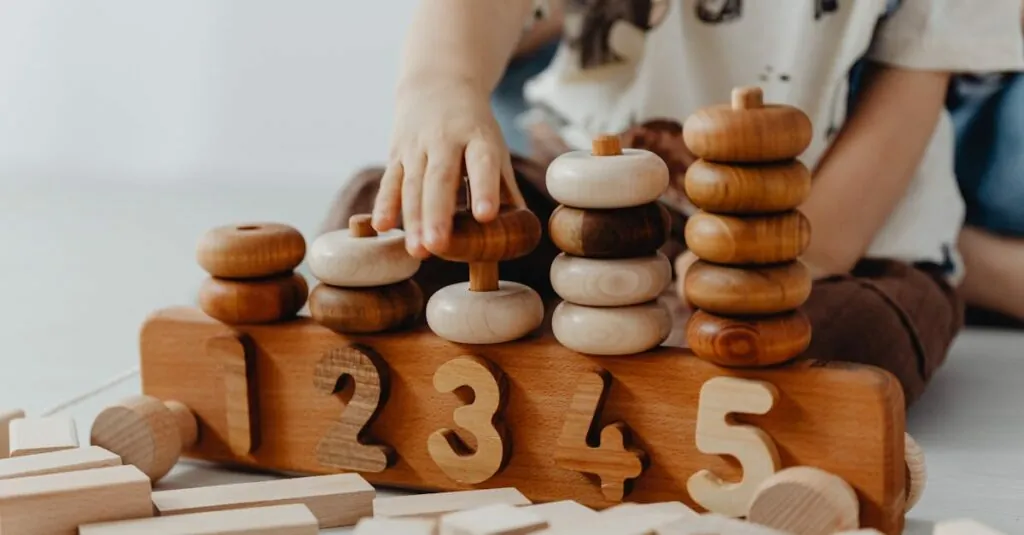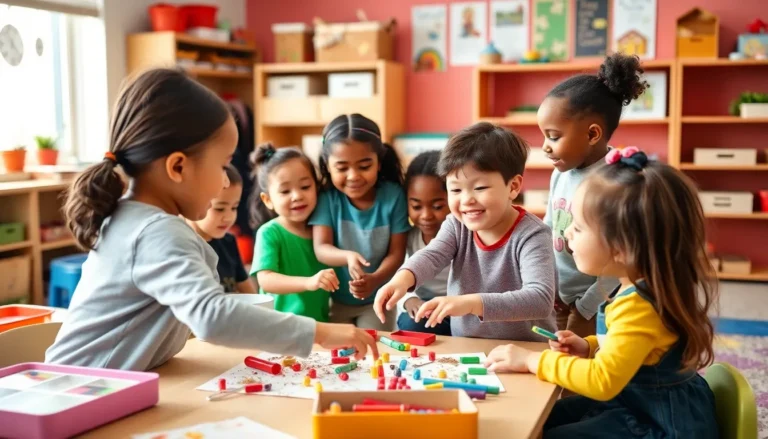Table of Contents
ToggleIn a world where toddlers seem to have boundless energy and an insatiable curiosity, the Montessori approach offers a refreshing way to channel that enthusiasm. Imagine a learning environment where kids can explore, discover, and grow at their own pace—without the constraints of traditional methods. It’s like giving them the keys to their own educational kingdom, complete with tiny, self-directed adventures.
Overview Of Montessori Toddler Education
Montessori toddler education emphasizes the importance of a specially prepared environment that encourages independent exploration. At this stage, children aged 1 to 3 years thrive in settings tailored to their developmental needs. Engaging materials promote sensory experiences, allowing toddlers to interact with the world around them.
Learning occurs through self-directed activities, fostering decision-making skills. Each child chooses their tasks, fostering autonomy while developing critical thinking. Caregivers play a supportive role, guiding children rather than directing them, which nurtures a sense of self-confidence.
Social interaction forms an essential part of the Montessori approach. Children benefit from collaboration with peers, developing communication and empathy skills. Group activities create opportunities for learning from one another, enhancing the overall experience.
Routine activities also hold significant value. Daily responsibilities such as cleaning up or organizing materials help toddlers build a sense of order and responsibility. These practices encourage practical life skills that extend beyond the classroom.
In addition, the Montessori philosophy respects individual learning paces. Each child progresses according to their unique timeline, which enhances motivation and engagement. Assessments focus on observation rather than testing, offering insights into each child’s growth.
Finally, the relationship between caregivers and children establishes a strong foundation for learning. Consistency and trust enable toddlers to explore freely and confidently, fostering a lifelong love of learning. Montessori toddler education creates a holistic framework that supports children’s developmental needs while celebrating their natural curiosity.
Key Principles Of Montessori Approach
The Montessori approach focuses on fostering independence and curiosity in toddlers. It emphasizes several key principles that support tailored learning.
Child-Centered Learning
Child-centered learning forms the foundation of the Montessori method. This principle ensures that children guide their education, selecting activities that excite them. Emphasis on individual interests means that each child learns at their own pace. Teachers facilitate rather than direct learning, helping toddlers make choices and build confidence. Each environment is designed to be enticing, allowing children to explore freely. Observation plays a vital role in understanding needs and progress, leading to personalized support.
Hands-On Activities
Hands-on activities engage toddlers in meaningful learning experiences. Materials are carefully chosen to promote sensory exploration and skill development. Activities often involve practical life skills, such as pouring, sorting, or cleaning, which enhance independence. Each task requires active participation, fostering a sense of accomplishment. Engaging with tangible materials aids in solidifying concepts and understanding. Children develop problem-solving abilities and creativity through exploration. Such experiences not only captivate attention but also build essential cognitive skills.
Benefits Of Montessori Toddler Education
Montessori toddler education offers numerous advantages that support early childhood development. The approach fosters a natural love for learning while promoting independence and curiosity.
Cognitive Development
Cognitive development flourishes in the Montessori environment. Engaging materials encourage hands-on exploration, which enhances critical thinking and problem-solving skills. Activities like sorting, stacking, and matching allow toddlers to understand concepts such as quantity and relationships. Children experience learning through their senses, solidifying knowledge through tactile experiences. Observation plays a significant role in assessing progress, enabling caregivers to tailor activities to individual needs. A focus on choice encourages motivation and interest, leading to deeper understanding. Moreover, the freedom within structured environments empowers toddlers to follow their natural instincts, making learning both enjoyable and effective.
Social Skills
Social skills develop naturally within a Montessori setting. Interactions with peers promote collaboration, communication, and empathy. Group activities encourage teamwork, as children work together to solve problems and share ideas. Reflection on experiences fosters emotional intelligence, allowing toddlers to understand their feelings and the emotions of others. Respect for diverse learning paces cultivates patience and acceptance, important traits in social situations. Routine activities such as cleaning up and sharing materials teach responsibility and cooperation. These experiences lay the foundation for healthy relationships, crucial for emotional and social development in early years.
Challenges In Implementing Montessori Techniques
Implementing Montessori techniques presents specific challenges. Adapting traditional spaces into Montessori environments requires planning and consideration. Caregivers may find it difficult to relinquish control. A shift from directing to facilitating children’s learning demands an adjustment period.
Resources and training can pose barriers. Not all caregivers receive extensive training in the Montessori philosophy. A lack of knowledge can hinder effective implementation. Community support also plays a role; without it, the transition may feel overwhelming.
Time constraints impact the ability to create a prepared environment. Caregivers often juggle multiple responsibilities, limiting their involvement. Maintaining an engaging atmosphere requires ongoing effort and commitment. Routine maintenance of prepared materials ensures longevity and quality learning experiences.
Child readiness varies, leading to discrepancies in engagement. Individual differences in developmental stages can make it difficult to meet every child’s needs. Observing and adapting to each child’s learning style remains essential for effectiveness.
Parental expectations may conflict with Montessori principles. Some parents may not understand the benefits of child-led learning. Communicating the philosophy clearly helps align expectations, fostering collaboration between home and the learning environment.
Resistance to the Montessori approach can occur. Traditional methods deeply rooted in education may create skepticism. Demonstrating positive outcomes through experience can gradually build trust in Montessori methods.
Overall, addressing these challenges requires patience and commitment. Proactive communication and community involvement support a smoother transition to Montessori techniques. Recognizing and overcoming these hurdles enhances the implementation of this enriching educational approach.
Practical Tips For Parents
Creating a Montessori-inspired environment at home starts with selecting appropriate materials. Choose engaging, age-appropriate toys that encourage exploration and independence. Natural materials like wood or cloth often promote sensory experiences and stimulate curiosity.
Encouraging self-directed play supports toddlers’ independence. Set aside dedicated time each day for your child to explore freely without direct supervision. Observing during these moments allows parents to understand their child’s interests and developmental needs better.
Implementing daily routines can help toddlers develop a sense of order and responsibility. Involve children in tasks like setting the table or cleaning up their toys, which fosters a sense of accomplishment and contributes to their understanding of community roles.
Establishing a consistent schedule also benefits learning and exploration. Consistency provides a framework where children feel secure, which allows them to thrive emotionally and socially. Make adjustments as needed to ensure the routine remains flexible and responsive to changing needs.
Connecting with a local Montessori community can offer valuable support. These networks often provide resources, workshops, and shared experiences, enhancing parents’ understanding of Montessori principles. Engaging with other families creates a supportive environment for children to grow together and build social skills.
Adapting the home environment can include creating specialized areas for different activities. Designate spaces for art, reading, and sensory play to encourage varied experiences while maintaining order. This organization promotes focus and helps toddlers transition smoothly between activities.
Embracing the Montessori approach for toddlers sets the stage for a rich and engaging learning experience. By fostering independence and curiosity children thrive in an environment tailored to their developmental needs. Caregivers play a crucial role in this process by facilitating exploration and nurturing self-confidence.
The benefits of this method extend beyond academics as toddlers develop essential social skills through peer interactions. Establishing routines and responsibilities further enhances their sense of order and cooperation. While challenges exist in implementing Montessori techniques adapting traditional spaces and mindsets can lead to profound growth for both children and caregivers.
Ultimately the Montessori philosophy celebrates the natural curiosity of toddlers creating a holistic framework that supports their journey of discovery and learning.








